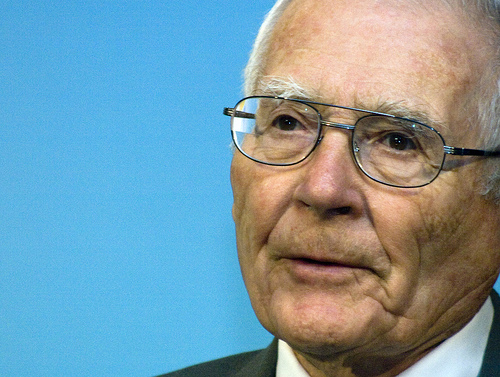James Lovelock became famous in the science community — and in popular culture — for the Gaia hypothesis, which postulated that Earth’s physical and biological systems interact to form a single, coherent, self-regulating organism. It was an idea that met with intense skepticism but went on to gain some acceptance, spark new lines of inquiry, and secure Lovelock a place in science history.
That was in the 1970s. Since then, he’s mainly written books about it. Early this century, he apparently got tired of being out of the public eye. In 2004, he made a big fuss scolding enviros that they would have to accept nuclear power. In 2006, he warned that “billions of us will die and the few breeding pairs of people that survive will be in the Arctic where the climate remains tolerable.” In 2008, he said “democracy must be put on hold” in order to respond to climate change. In 2009, he reiterated that “the climate war could kill nearly all of us and leave the few survivors living a Stone Age existence.”
It seems apocalypse porn was no longer getting headlines, so Lovelock’s latest provocation is that, woops, he went too far, he was an alarmist, and what’s more, Al Gore’s an alarmist too! The climate crankosphere is all a-flutter about this. “Warmist recants,” etc. etc.
I guess I’m not clear why we’re supposed to follow along with rapt attention as James Lovelock gets his knickers in and out of a twist. If we are concerned with the latest results from climate science, we’re in luck: scientists frequently report on them! They publish in scientific journals, organize reviews, and write popular articles. Back in 2009, around the time of the Copenhagen talks, a group of 26 climatologists released the “Copenhagen Diagnosis,” which reviewed hundreds of scientific papers released since the 2005 cut-off date for the 2007 IPCC report. The World Resources Institute has round-up of the latest climate science. Joe Romm also pulled together dozens of studies in 2010.
All the recent science points in roughly the same direction: Climate change is hitting harder and faster than expected. Ice is melting and sea levels are rising faster than projections. We are currently on a trajectory for what were previously considered worst-case scenarios. MIT, the Met Office’s Hadley Center, and the International Energy Agency all warn of warming this century of 5 degrees C or greater; we know that higher than 4 degrees C is almost certain to be catastrophic. Maybe not “billions of people die and survivors rut like animals at the poles” catastrophic, but catastrophic enough to make further delay insane and immoral.
James Lovelock made a great show of going overboard. Now he’s made a great show of backpedaling. Both have generated a great deal of media coverage at the expense of obscuring the facts and discrediting serious climate science. Can we change the channel now?




